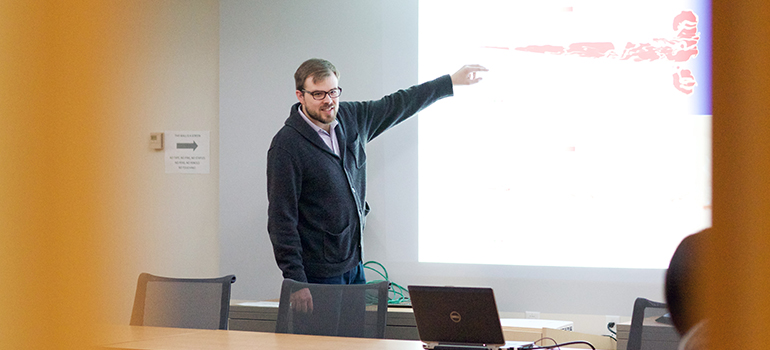Using computer modelling, researchers at UBC Okanagan are seeking to better understand the environmental and safety consequences of liquefied natural gas (LNG) system failures and spills.

The researchers have forged a collaboration with Westport Fuel Systems, Fortis BC, BC Ferries and the Port of Vancouver to investigate the behaviour of liquefied natural gas (LNG) during storage and transportation in Canada’s trucking and maritime shipping industries.
“LNG is a cryogenic fuel, meaning that it is very cold, so it must be carefully stored, transported, and dispensed to minimize the release of methane vapour to the environment” explains Joshua Brinkerhoff, assistant professor at the School of Engineering and the project’s principle investigator
The goal of the project is three-fold, one is a better understanding of spill consequences; the other is thorough analysis of how LNG behaves in real industrial systems; and the third is to develop lower-cost ship steels that can withstand the thermal shock of an LNG spill on the deck. The last objective will involve Dr. Jasmin Jelovica, a professor of naval architecture at UBC’s Vancouver campus.
According to Brinkerhoff, the research will develop a suite of computer-based modelling to evaluate the behaviour of LNG during storage and transport in trucks and ships. It will also lead to lower-cost and safer steels for the new generation of cleaner ships powered by LNG.
Over 857 million tonnes of produced goods were transported by the commercial sector in 2015 of which 72% were carried by truck and 7% by marine shipment according to statistics from Transport Canada (https://www.tc.gc.ca/eng/policy/transportation-canada-2016.html#report-highlights).
Freight transportation accounts for approximately 39% of the total carbon emissions from Canada’s transportation sector, and unlike passenger cars, emissions from freight vehicles is increasing. Brinkerhoff and the project’s partners see an opportunity to reduce the carbon emissions of marine shipping and heavy-duty trucking by the use of alternative fuels like LNG.
Despite the upside of lower greenhouse gas emissions, there remains uncertainty in the transition to LNG as a fuel source, especially around safety and environmental impacts. Therefore, this multi-year research project will create simulation-based models in collaboration with the project’s industrial partners to ensure LNG can be used safely and cleanly.
“By evaluating the behaviour of LNG during storage and transport in trucks and ships, our models will predict everything from environmental dispersal of methane to defining the stresses in a ship deck subjected to an LNG spill,” explains Brinkerhoff. “Operators and regulators will then use that information to establish decision-making tools as the industry transitions towards alternative fuels.”
Ultimately, the research will assist in safely transitioning Canada’s trucking and marine shipping industries to lower-carbon fuels for significant carbon reductions and cost savings.
The research is supported by the Natural Gas Futures Consortium, an initiative of UBC’s Clean Energy Research Centre. Information on the consortium and a full list of consortium members is available from http://cerc.ubc.ca/research/natural-gas/#banner
The project recently received a collaborative research and development grant from the Natural Sciences and Engineering Research Council of Canada.